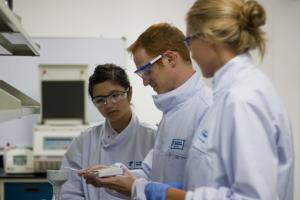Taking tissue regeneration beyond state-of-the-art

Their aim is to produce radical new treatments that will reduce the need for invasive surgery, optimise recovery and reduce the risk of undesirable scar tissue.
The research, which brings together expertise at the University of Nottingham and its Malaysia Campus (UNMC), is part of the “Rational Bioactive Materials Design for Tissue Generation” or “Biodesign” project – an €11m EU-funded initiative involving 21 research teams from across Europe.
“This research heralds a step-change in approaches to tissue regeneration,” says Professor Kevin Shakesheff, Head of the School of Pharmacy at the University of Nottingham's UK campus.
“Current biomaterials are poorly suited to the needs of tissue engineering and regenerative medicine. Our aim is to develop new materials and medicines that will stimulate tissue regeneration rather than wait for the body to start the process itself.”
UNMC is building on its expertise in nanotechnology for drug delivery. “Here in Malaysia we are looking at synthesising microparticles that can be injected directly into a patient at the site of injury to promote tissue re-growth,” says Professor Andrew Morris, an expert in transdermal drug delivery and Head of the School of Pharmacy (UNMC). “These microparticles would act as a scaffold to encourage regrowth in bone tissue, skeletal muscle and potentially even cardiac muscle.”
This research is going to have a significant impact on patients,” says Dr. Nashiru Billa who is the Associate Dean for Research in the Faculty of Science. “In future, you could include anti-cancer drugs in the delivery system that would not only lead to the growth of the tissue but would also help kill cancer cells within the bone tissue.”
For more information contact:
Josephine Dionisappu
PR & Communications Manager
Tel: +60 (03) 8924 8746
or
Dr. Nashiru Billa
Tel: +60 (03) 8924 8211.
Notes to editors:
The University of Nottingham has 43,000 students and is ‘the nearest Britain has to a truly global university, with campuses in China and Malaysia modelled on a headquarters that is among the most attractive in Britain’ (Times Good University Guide 2014). It is also the most popular university in the UK among graduate employers, one of the world’s greenest universities, and winner of the Times Higher Education Award for ‘Outstanding Contribution to Sustainable Development’. It is ranked in the World’s Top 75 universities by the QS World University Rankings.
Media Contact
All latest news from the category: Life Sciences and Chemistry
Articles and reports from the Life Sciences and chemistry area deal with applied and basic research into modern biology, chemistry and human medicine.
Valuable information can be found on a range of life sciences fields including bacteriology, biochemistry, bionics, bioinformatics, biophysics, biotechnology, genetics, geobotany, human biology, marine biology, microbiology, molecular biology, cellular biology, zoology, bioinorganic chemistry, microchemistry and environmental chemistry.
Newest articles

Properties of new materials for microchips
… can now be measured well. Reseachers of Delft University of Technology demonstrated measuring performance properties of ultrathin silicon membranes. Making ever smaller and more powerful chips requires new ultrathin…

Floating solar’s potential
… to support sustainable development by addressing climate, water, and energy goals holistically. A new study published this week in Nature Energy raises the potential for floating solar photovoltaics (FPV)…

Skyrmions move at record speeds
… a step towards the computing of the future. An international research team led by scientists from the CNRS1 has discovered that the magnetic nanobubbles2 known as skyrmions can be…





















